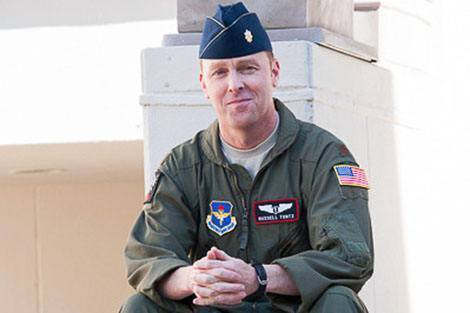May 13, 2013 — As a flight surgeon for the U.S. Air Force, Russell Tontz doesn’t perform surgery—the name “flight surgeon” is historical, dating to WWI—but he is a doctor specially trained to care for pilots. Most recently assigned to a fighter squadron, Tontz is familiar with the human body’s response to potential threats to normal physiology in the flight environment, such as G-forces, spatial disorientation, and oxygen deprivation. He’s spent time flying in the backseat of a fighter jet, which enabled him to see how pilots fare in action to sudden changes in air pressure or to swift dips, turns, and rolls. Before, during and after pilots deploy, Tontz makes sure they’re physically fit and healthy. And when they’re manning aircraft thousands of miles from home, Tontz cares for their families back home on the base.
Now Tontz—most recently chief of aerospace medicine at Mountain Home Air Force Base in Idaho—is slated to earn an MPH in health policy and management from Harvard School of Public Health (HSPH) in May 2013. He hopes the degree will help him develop strategies that promote better health among the pilots and their families who are his patients. He also plans to use what he learns at HSPH about health care policy and management to implement smarter, more efficient health care systems for the Air Force.
“The idea of a leaner, more efficient military machine is the future,” Tontz said. “We have great medical systems in the Department of Defense and the Veterans Administration, but how to better integrate the two is a work in progress.”
Tontz said he decided to concentrate on health policy at HSPH “to learn from the great policy minds like Professors [Robert] Blendon and [Nancy] Turnbull and leadership gurus like Drs. [Barry] Dorn and [Leonard] Marcus.” He added, “With all of the changes in health care going on in the civilian world, military health care has to keep up and stay current. I wanted to know more about policy so that I can better understand what goes on ‘at the big table’ where the decisions are really made.”
Tontz, a board-certified family medicine physician, said he’d like to help ensure that he and other Air Force health care providers “have enough time with our patients to be able to establish strong relationships—like those of the general practitioner, who used to know your kids, your family, your medical background. People have to come first. The more efficient our practice of medicine becomes, the safer and more personal our care can be.”
A long line of veterans
Tontz came to HSPH as part of the U.S. Air Force’s Residency in Aerospace Medicine (RAM), a three-year program that includes a master of public health, a year of aerospace medical training, and a year of either occupational or preventive medical training. As soon as he finishes at HSPH, Tontz, his wife Kara and their two young children will head to Wright-Patterson Air Force Base in Dayton, Ohio so that he can complete the remainder of the RAM program. “The physicians that come through this program become the medical leaders of the Air Force,” Tontz said.
Tontz comes from a long line of military-trained health care providers; he grew up on military bases. His grandfather was a pediatrician in the Navy during World War II. One uncle was a Navy orthopedic surgeon, and his father and another uncle were both Navy dentists. Tontz jokingly said he chose the Air Force instead of the Navy because he “didn’t want to be stuck on a ship and the Air Force had better golf courses.”
Creating deeper understandings
Tontz chose HSPH from among several top public health schools partly for its reputation. He was impressed with Harvard’s history of training military physicians. And he is grateful for the university’s visible acknowledgement of the contributions of its military veterans, demonstrated by commemorative plaques around the campus, President Drew Faust’s publicly voiced appreciation for military service, and her reinstatement of ROTC on campus. “To see how Harvard appreciates its veterans is phenomenal,” he said.
Tontz said studying at HSPH has broadened his views about health care and has given him the “great opportunity to share in this culture of diversity.” Likewise, he has been able to share his own experiences with fellow students—and perhaps broaden their views as well.
One fellow international student told Tontz that his previously negative ideas about the U.S. military softened after meeting him. “I have to say, that has to be the biggest compliment I’ve received here at Harvard,” said Tontz. “Wearing a uniform you are always on display. I am very happy to have gained the respect of this international classmate of mine, and hope he and my other classmates understand a little better how much we in the military do care about the public’s health.”
photo: Aubrey LaMedica
